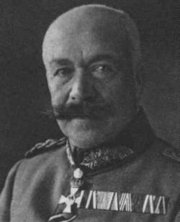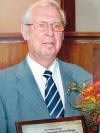
FAQ 1.
What is a Prussian?
Q. What exactly is a 'Prussian'? How would you define one? As there is no Prussian state, does that mean that there are no longer any Prussians?
 A. This is a very complex question and there are no simple answers. The simplest and best answer is that a Prussian is someone who believes he (or she) is one. Though racially and culturally Prussians were historically Germans, Prussia had a large Slav population (West Prussian Kashubians, Silesian Schlonzaks, East Prussian Masurians, Hultschin Czechs and Poznanian Poles), East Prussian Lithuanians, West and East Prussian Dutch, Englishmen and Scots, Jews and French Huguenots (Infantry General Hermann von François, who achieved fame in the East Prussian campaign of 1914, being a famous example - see picture to right). To be a Prussian is not, therefore, to necessarily be a German racially as the ethnic complex of the Prussian state demonstrates. Clearly Von François became Prussian by citizenship - by adopting a new homeland when he was driven out of France with other Protestants fleeing Catholic persecution. So citizenship in the state of Prussia makes one a 'Prussian'. Additionally, acceptiong the Prussian culture (which was essentially German) but not necessarily a particular 'religion' since Prussia consisted of majority Lutheran-Protestants, with a large Catholic minority, and much smaller Reformed Protestant and Jewish minorities.
A. This is a very complex question and there are no simple answers. The simplest and best answer is that a Prussian is someone who believes he (or she) is one. Though racially and culturally Prussians were historically Germans, Prussia had a large Slav population (West Prussian Kashubians, Silesian Schlonzaks, East Prussian Masurians, Hultschin Czechs and Poznanian Poles), East Prussian Lithuanians, West and East Prussian Dutch, Englishmen and Scots, Jews and French Huguenots (Infantry General Hermann von François, who achieved fame in the East Prussian campaign of 1914, being a famous example - see picture to right). To be a Prussian is not, therefore, to necessarily be a German racially as the ethnic complex of the Prussian state demonstrates. Clearly Von François became Prussian by citizenship - by adopting a new homeland when he was driven out of France with other Protestants fleeing Catholic persecution. So citizenship in the state of Prussia makes one a 'Prussian'. Additionally, acceptiong the Prussian culture (which was essentially German) but not necessarily a particular 'religion' since Prussia consisted of majority Lutheran-Protestants, with a large Catholic minority, and much smaller Reformed Protestant and Jewish minorities.
 Though later there would be an unfortunate Protestant-dominated Kulturkampf in Prussia under Bismarck, before this Prussia was always religiously tolerant. In spite of this anti-Catholic activity, both Protestants and Catholics regarded themselves as 'Prussian'. Indeed, I was well acquainted with the former President of the Landsmannschaft Westpreussen (Hans-Jürgen Schuch - see picture to right), originally from Elbing, who was Catholic and as Prussian as they come, and for whom I did some research work. So in spite of the Kulturkampf, to be a Prussian was never exclusively a Lutheran phenomenon. Today there is no state of Prussia but there are hundreds of thousands of men and women like Hans-Jürgen Schuch who, whilst being citizens of the Federal Republic of Germany (there arre Prussians who are citizens of the Polish Republic, United States, and elsewhere too), nevertheless regard themselves as 'Prussian'.
Though later there would be an unfortunate Protestant-dominated Kulturkampf in Prussia under Bismarck, before this Prussia was always religiously tolerant. In spite of this anti-Catholic activity, both Protestants and Catholics regarded themselves as 'Prussian'. Indeed, I was well acquainted with the former President of the Landsmannschaft Westpreussen (Hans-Jürgen Schuch - see picture to right), originally from Elbing, who was Catholic and as Prussian as they come, and for whom I did some research work. So in spite of the Kulturkampf, to be a Prussian was never exclusively a Lutheran phenomenon. Today there is no state of Prussia but there are hundreds of thousands of men and women like Hans-Jürgen Schuch who, whilst being citizens of the Federal Republic of Germany (there arre Prussians who are citizens of the Polish Republic, United States, and elsewhere too), nevertheless regard themselves as 'Prussian'.
In a census taken after the First World War in the newly independent Polish state, citizens were asked whether they considered themselves to be Polish, White Russian or Ukrainian ethnically. One White Russian simply answered: "I am here" and would say no more. He didn't want to be classified. The bottom line is what you believe yourself to be. If you identify with Prussia then that, in my book, makes you a Prussian, whether you are in the former territory belonging to the Prussian state or elsewhere. That, at least, can be the only acceptable definition other than you are a descendant of one who formerly was a Prussian citizen, but even then there are modern Germans whose ancestors came from Prussia who do not regard themselves as 'Prussian' but simply 'German', 'Polish' or 'American' or whatever. If the Prussian State is ever restored - and it nearly was in 2001 in Germany when the SDP government proposed merging the Länder of Brandenburg and Berlin and renaming it 'Preussen' (Prussia) - and it might be if Northern East Prussia (currently the Kaliningrad Oblast in the Russian Frederation) ever became independent and was renamed Prussia - then another kind of Prussian might suddenly come into existence, one who is racially almost entirely Russian. But then that would only be a political concept, not a cultural one, for the Kaliningraders (including the tiny German minority living there who did not originally come from East Prussia but from the Russian heartland and other republics like Kazakhstan and the German Volga Republic), who are beyond question Russian culturally.
Which brings us full circle. For in the days of General von François, a French Huguenot fighting on the German site, and a loyal Prussian, the Germans faced a Russian General of German extraction called Paul von Rennenkampf who had a distinguished career in the Russian army before the communists executed him. Sad to say, the Russians did not treat their Germans as well as the Prussian Germans treated their Frenchmen.
What is a Prussian? That's up to you to decide. I know what I am.

Created 20.01.2008 | Updated 20.01.2008
Copyright © 2008 SBSK Preussens Gloria
Alle Recht vorbehalten - All Rights Reserved


